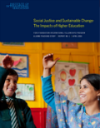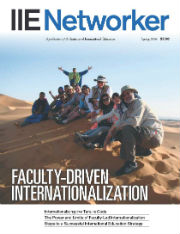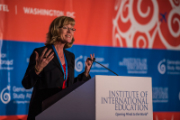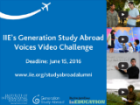|
 |
|
The Carnegie African Diaspora Fellowship Program (CADFP) has announced its selection of forty-one African universities to host 59 African-born scholars from the United States and Canada. These Fellows will travel to Ghana, Kenya, Nigeria, South Africa, Tanzania, and Uganda for visits ranging from two weeks to three months, where they will conduct academic projects with their peers at the host universities in order to meet specific needs at the institutions. These projects are cross-disciplinary, including subjects such as agroforestry, e-learning modules, ethnomusicology, and military mental health. The CADFP, now in its third year, is designed to avert Africa’s brain drain, build capacity at host institutions, and develop long-term, mutually-beneficial collaborations between universities in Africa and the United States and Canada. It is funded by Carnegie Corporation of New York and managed by the Institute of International Education (IIE) in collaboration with United States International University Africa (USIU-Africa) in Nairobi, Kenya, which houses the Advisory Council.
Universities in eligible host countries can submit a project request for visiting scholars to come to their universities starting in December 2016, with applications open through July 5, 2016. African-born academics residing in the United States or Canada can apply any time, and are matched with accepted projects on a rolling basis. Prospective hosts and Fellows can find eligibility requirements and instructions in the " How to Apply" section of the program’s website. |
 |
|
Last month, IIE hosted a panel discussion and reception to mark the release of a new IIE report, Social Justice and Sustainable Change: The Impacts of Higher Education. This report, which surveyed nearly 2,000 alumni across 22 countries, yields the first results of a groundbreaking 10-year impact study of the Ford Foundation International Fellowships Program (IFP). The report shows that funding the post-graduate academic pursuits of emerging social justice leaders from marginalized groups leads to significant, measurable benefits for communities and organizations in their countries and throughout the world. The event provided a forum for discussion on the implications of the study’s findings, as well as the most effective ways for philanthropic investment to empower social justice leaders to drive social change.
|
Don’t miss your chance to apply for the IIE partnership programs available in 2016. The applications for IAPP New Zealand, Mexico, and Cuba are open and accessible through the same online application portal.
Applications for the Mexico and Cuba programs that are received by May 13th will be the first to be evaluated and applicants will be given early acceptance decisions.
The final application deadlines for each program are as follows:
New Zealand: May 16, 2016
Mexico: June 10, 2016
Cuba: June 10, 2016
Informational webinars for both the Mexico and Cuba programs will be held on May 9th and May 10th. These sessions will discuss the application, program overview, and study tour details. To register for either webinar, use the following links: Mexico Informational Webinar | Cuba Informational Webinar
At a recent symposium put on by IIE, several exiled researchers came together to tell their stories and highlight the urgent need for support, as fewer than 10% of displaced scholars have resumed their academic careers.
NYIT’s thoughtful and innovative approach to maintaining a presence overseas is drawing recognition as the university system brings together its campuses across 7 countries for a collaborative, cohesive learning experience.
Looking at the 48 most popular countries among American study abroad participants, a research firm has ranked the top 24 least expensive and most expensive countries to study based on nine cost indicators.
|

 |
|
In the recent IIENetworker magazine, David R. Lee, Heike Michelsen, and Marina Markot describe mechanisms created at Cornell University to internationalize faculty and to integrate experiences and learning into the curriculum. They share a number of new projects, courses, and programs created as a result of newly generated university-wide grant programs. "Faculty played a key role for example in two symposia on ‘meaningful international experiences’ for students and their integration into the curriculum," write Lee, Michelsen, and Markot.
|
Dr. Allan E. Goodman, President and CEO of the Institute of International Education, describes his interactions with international students at a Ohio university that sparked his idea to develop IIE’s recent publication, Preparing to Study in the USA: 15 Things Every International Student Should Know. "[Co-author Stacie Berdan and I] discovered that there was an awful lot about American higher education that did not translate well into other cultures. This book is our effort to gather in one volume some of the most confusing things about our system as well as the culture surrounding it, and then try to explain it from the viewpoint of someone encountering it for the first time."
The American Council on Education’s Center for Internationalization and Global Engagement (CIGE) has released the third and final installment of a three-part series on internationalizing the co-curriculum, entitled Internationalization and Student Affairs. The report posits that the contributions of student affairs professionals are essential for moving the internationalization of higher education from vision to reality. As internationalization accelerates on U.S. campuses, administrators rely on student affairs and student services personnel to do more—not only to serve more international students, but to help all students develop global and intercultural competencies. As higher education institutions worldwide become increasingly connected, the student affairs profession, too, is becoming more global. Part three of the report addresses the challenge of adapting U.S. models of student affairs to new cultural contexts. The report is part of CIGE’s Internationalization in Action series, which seeks to provide guidance to institutions engaged in internationalization, and features institutional strategies and good practices gathered from participants in CIGE programs and other experts in the field.
 |
|
The 2016 IIE Summit on Generation Study Abroad will take place on October 23-25, 2016 at the Omni Shoreham Hotel in Washington, DC to bring education, government and business leaders and journalists together for action-oriented discussion on how to ensure international experience is a key part of a 21st century education and make study abroad opportunities available to all. The 2016 IIE Summit is part of IIE’s Generation Study Abroad®, a five year initiative to double the number of U.S. students studying abroad by the end of the decade. Generation Study Abroad seeks to significantly increase and diversify participation by bringing higher education institutions, employers, governments, K-12 teachers, associations, and others together to build on current best practices and find new ways to extend study abroad opportunities and resources to tens of thousands of college students whose needs are not currently served by existing study abroad programs. The Summit will continue to push the envelope to change how we think and "do" study abroad as we work together to achieve our ambitious goal of doubling by the end of the decade.
|
 |
|
IIE is pleased to announce, in partnership with The New York Times in Education, the 2016 Generation Study Abroad Voices Video Challenge. Study abroad returnees are encouraged to submit digital story submissions between 0:30 and 2 minutes long that demonstrate how study abroad gave them an edge, the impact it had on their personal or professional life, and how The New York Times content helped them navigate, enhance or make sense of their experience. Winners will receive a $1,000 cash prize, an iPad, a trip to the IIE Summit on Generation Study Abroad in Washington D.C., and a video spotlight on The New York Times in Education website. Winners will also be recognized as a Generation Study Abroad Voice. |
The Global Innovation Initiative is a joint effort of the United States and the United Kingdom to strengthen global multilateral collaboration through grants to university consortia focusing on science, technology, engineering, and mathematics (STEM)-related issues of global significance that foster cutting-edge multinational research and strengthen institutional international partnerships. Each month, IIE highlights the work accomplished by one of the 16 Global Innovation Initiative award recipients. The spotlight is a chance to learn about the ground-breaking work being done as a result of the GII funding and the impact these projects are having in their communities. The first IIE Spotlight is Ohio Stat University with the project "Increasing Global Food Security by Controlling the Dissemination of Antibiotic Resistance".
The Australian Government has released three strategies to underpin Australia’s international education sector. The National Strategy for International Education 2025; the Australia Global Alumni Engagement Strategy; and the Australian International Education 2025 (AIE2025) market development roadmap will help the sector take advantage of global opportunities and continue to flourish. The National Strategy for International Education 2025 will enable Australia’s international education sector to be more adaptive, innovative and globally engaged. Complementing the National Strategy, the AIE2025 roadmap will position Australia to capitalize on new opportunities and markets over the next decade. The Australia Global Alumni Engagement Strategy will seek to leverage Global Alumni to promote Australia’s diplomatic, trade and investment interests.
|
| |
|










